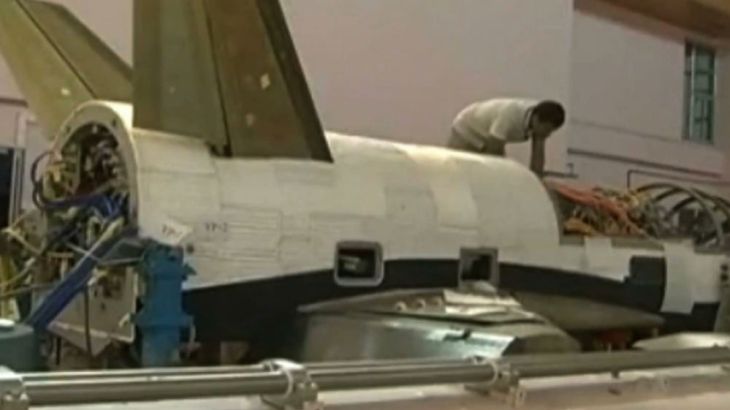Indian space shuttle makes first test flight
India successfully launches an experimental spacecraft it hopes will form the basis of its own re-usable space shuttle.

India’s space agency ISRO has launched a rocket from its facility north of Chennai carrying an experimental spacecraft it hopes will mark an important step towards the country’s first re-usable space shuttle.
“We have successfully accomplished the RLV mission as a technology demonstrator,” ISRO spokesman Devi Prasad Karnik told reporters.
Keep reading
list of 4 itemsChina trying to develop world ‘built on censorship and surveillance’
Why does NASA want a time zone on the moon?
Could shipping containers be the answer to Ghana’s housing crisis?
The $14m Reusable Launch Vehicle, or RLV-TD, which is around the size of a minibus, was lifted to an altitude of 70km before re-entering the Earth’s atmosphere, exposing it to temperatures of up to 2,000C.
“Whether the thermal coating on the space plane can withstand that kind of heat pressure is one thing that needs be vetted at this particular stage,” Rajeswari P Rajagopalan, the head of the independent think-tank Nuclear and Space Policy Initiative at the Observer Research Foundation, told Al Jazeera.
One-sixth the size of the planned shuttle, this test flight was also designed to see if the shuttle could glide and navigate at speeds of up to 6000kmph, before attempting a landing on the sea in the Bay of Bengal.
“The wings are very small, so it’s still going to be a very huge challenge to land it on a runway and therefore we are landing it straight back on the ocean,” says Rajagopalan.
The test mission was an important step towards developing a full-scale, reusable shuttle to send up satellites.
INFOGRAPHIC: India’s mission to Mars
The shuttle is not expected to come into service for at least 15 years but ISRO hopes the technology will reduce costs and make access to space more affordable.
In 2014 India celebrated putting a spacecraft into orbit around Mars, a mission costing just $73m, a tenth the amount NASA and the European Space Agency spent on their missions to the red planet.
It also made India the first Asian nation to do so, and the first country to do it on its first attempt.
“There is a flourishing space programme under the Chinese military leadership and that is a direct challenge for India, which India has to respond to, otherwise we are going to be left lagging behind,” says Rajagopalan.
ISRO is planning further tests of the technology, including the supersonic scramjet engine it hopes will power the craft.
Global race
The race to develop re-usable space vehicles is being led by private US space companies SpaceX, Blue Origin and Sierra Nevada Corp, which has developed the Dream Chaser shuttle, expected to begin resupply missions to the International Space station in 2019.
Until now, only the US, USSR, Europe and Japan have successfully launched space shuttles.
The most famous and successful of these was NASA’s space shuttle, a mainstay of its space programme, flying 135 missions over 30 years.
Since it was decommissioned in 2011 the Boeing has been testing another, much smaller shuttle for the US Air Force.
The X-37B Orbital Test Vehicle is currently on its third unmanned flight and has been in orbit for the past year.
Its secret activities have provoked speculation that it is a spy satellite or being tested to deliver weapons from space, both claims the Pentagon has denied.